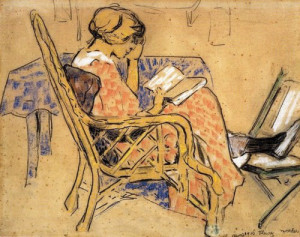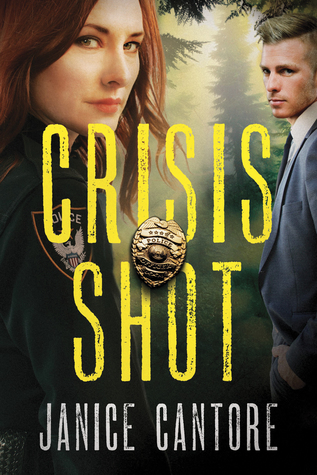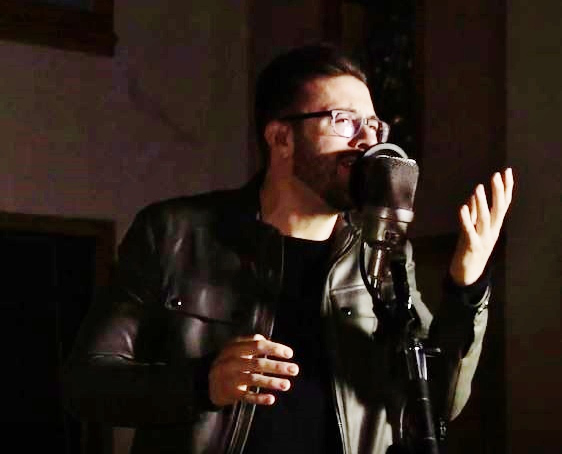 Having decided to make a real effort this year to read the back catalogues of some of my favourite writers I jumped in at what might be thought of as the deep end (that’s certainly the way I found myself thinking of it) and picked up David Mitchell’s first novel, Ghostwritten. The first Mitchell novel I read was The Bone Clocks and I then went back one when The Thousand Autumns of Jacob de Zoet turned up on a book group list. I also read the novella Slade House as soon as it was published. What struck me about all of those books, each of which I really enjoyed, was the way in which the intertwining which is characteristic of each individual novel was extended between the texts themselves. Characters, and more importantly, ideas, slip and slide between one volume and the next. Consequently, I’ve had it in mind for some time to go back to the beginning and try and trace the intricacies of Mitchell’s thinking throughout the entire sequence.
Having decided to make a real effort this year to read the back catalogues of some of my favourite writers I jumped in at what might be thought of as the deep end (that’s certainly the way I found myself thinking of it) and picked up David Mitchell’s first novel, Ghostwritten. The first Mitchell novel I read was The Bone Clocks and I then went back one when The Thousand Autumns of Jacob de Zoet turned up on a book group list. I also read the novella Slade House as soon as it was published. What struck me about all of those books, each of which I really enjoyed, was the way in which the intertwining which is characteristic of each individual novel was extended between the texts themselves. Characters, and more importantly, ideas, slip and slide between one volume and the next. Consequently, I’ve had it in mind for some time to go back to the beginning and try and trace the intricacies of Mitchell’s thinking throughout the entire sequence.
Well, this would have been an excellent idea if I hadn’t then decided to read Ghostwritten at a time when I was very definitely suffering from post viral fatigue. It is not a book to read when the little grey cells are refusing to fire at even fifty percent of normal capacity (and that is assuming that normal capacity is anything to boast about in the first place). So, what follows is more a collection of thoughts sparked by the reading than any attempt at a cogent review, which would require me to bring those thoughts together and link them into a coherent whole.
The first thing that I was aware of was that I would have read this book very differently if I hadn’t already encountered Mitchell’s later works. In fact, if this had been the first of his novels that I’d read, the only thing that would have kept me reading would have been my research interest in the way in which writers organise their narrative material. The book is structured as a sequence of episodes (not short stories – they are definitely episodes from longer narratives) and at first the evidence of any link between those episodes is very tentative. Indeed between the first two for a long time the only link I could pinpoint was the use of the term ‘quasar’. However, because this wasn’t my first encounter with Mitchell’s style I was primed to be looking out for links, even if they only appeared at the level of the word. And also primed to be aware that something as structurally emphatic as the first of those links would be of great importance as the novel developed. ‘Quasar’ clues us into the world of science and latterly, more precisely, the world of quantum physics, which moves us onto what I think is Mitchell’s chief concern, embodied in the title.
So, the second thing which struck me was the various possible meanings of the title. We ignore a title at our peril. We used to give the students a text, a list of instructions, with the title removed and ask them what they thought they were being asked to do. If they ever did get the right answer it was more as a result of a wild guess than through any clues they picked up from the text itself. Without the title they were floundering. So what does Ghostwritten mean? Well, the first clue, (for me, at least) came in the episode where the narrator is a free floating consciousness that moves from body to body and directs the behaviour of those individuals that it inhabits. Our lives are controlled by a force outside ourselves? They are written by a ghost? That would certainly link back to the first episode where ‘Quasar’ has given over his life to the machinations of a cult leader. Then we have an episode set in London in which the main character, Marco, is ghostwriting the memories of the ageing Alfred. Surprisingly, I hadn’t so much as given the practice of an author ghost writing for someone else a thought. However, I think Mitchell’s real concern makes itself felt when we reach the section of the novel that deals with quantum physicist, Mo. Against all she has been promised, Mo has seen her research put to military use and knows that the hundreds of people who have already died as a result are but the tip of the iceberg. She tries to resign from her job only to be told that she can’t, that she, her current research and anything that she might develop in the future belong to the American Government. Her life, the way she tells her own story, is being written by someone else. She no longer has control of it. She embodies what Alfred has already made clear to Marco, that
we all think we’re in control of our own lives, but really they’re pre-ghostwritten by forces around us.
Intending always to make her way back to the small Irish village that is home, she goes on the run for long enough to allow her to develop the ultimate ghost writer, the zookeeper, a piece of technology that can take its own decisions and override the commands of its political overlords. It’s a nice thought.
Another question which seems to concern Mitchell is the difficulty of pinning down realities. This crops up in the discussions around quantum physics:
Quantum physics speaks in chance, with the syntax of uncertainty. You can know the position of an electron but you cannot know where it’s going, or where it is by the time you register the reading. Or you can know its direction, but you cannot know its position.
and again when exploring the nature of chance and fate.
Does chance or fate control our lives?… If you’re in your life, chance. Viewed from the outside … it’s fate all the way.
Talk about cerebral overload.
But, for me the really interesting discussion is the one to do with story and memory. Let’s take memory first. The notion that memories are actually only stories that we tell ourselves, embellishing what really happened as we go, is nothing new. In We Are All Completely Beside Ourselves Karen Joy Fowler explores what she calls screen memories: the memories we superimpose over the reality of our experiences. Here Mitchell suggests that the act of memory is an act of ghostwriting and that memories are their own descendants masquerading as the ancestors of the present. I’m sure if we’re honest we can all remember occasions when we have polished up a memory to make a better story in the telling and once we do that there is always the possibility that we will begin to believe the tale that we have created and replace the original events in our own minds with the enhanced version. But that would suggest that the teller is in control of the story. Mitchell doesn’t seem to agree with that.
The human world is made up of stories, not people. The people the stories use to tell themselves are not to be blamed.
I have to admit that I don’t completely follow that. Story is essential to who we are. I absolutely believe that. Barbara Hardy once wrote that narrative is a primary act of mind and for me it is one of the things which distinguishes us from other creatures. But this seems to suggest that story writes us. I need to think more about that when the little grey cells are functioning on a higher level. Or perhaps I need to read the next book.
So, as I said, not a review, just a set of responses to what is clearly a very complex book. Will I go on and read Number9dream? Definitely, but not immediately and possibly not before I have read Ghostwritten a second time. There are some seriously interesting ideas being explored here and I’d like to get a better grasp of them before moving on.
Advertisements Share this:




